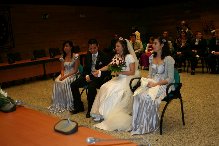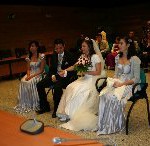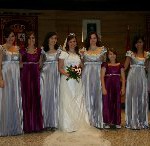The Inclusivity of Spanish Weddings
By Clara Molina
I still clearly remember a YW’s class I had back in 2004 when we (the YW) were told about the possibility of the temple sealing ceremony being considered as legal marriage in Spain. Everyone was excited about the idea; finally, ‘our marriage’ would be on the same level as other religious marriage ceremonies held in Spain. However, there was a big BUT: If you were a worthy member of the church who held a recommend, BUT chose to have a civil wedding ceremony, you would have to wait a year in order to get sealed, because, you know, if you chose to have a ‘regular’ ceremony you are not showing respect for the sacred institution of marriage; you would be choosing the world instead of The Church. To state it a little bit clearer, we were told we were supposed to marry directly in the temple, without any other kind of ceremony.
To say that this piece of information horrified me would be an understatement… Wait a second. What happens with my family?. What happens with my non-member friends? They cannot go to the temple!!
The rest of the YW in the class had very similar reactions. We could not understand why, given the importance The Church places in families, so many of our loved ones would be deprived of attending our weddings. Now, you have to understand that most of us (who are now in our early or mid-twenties) are 2nd generation members. Our parents converted to The Church before or shortly after we were born. Our extended family is not in The Church. I literally know no one from Spain whose entire family belongs to The Church. The idea of excluding a large number of our family from our (future) weddings felt outrageous and wrong – mostly wrong. By the way, as of today, temple sealings are not legally regarded as marriage in Spain.
Before continuing, I should probably tell you I am not really into weddings. I have never dreamed of a big wedding in which my father walked me down the aisle, with all my family and friends watching. In fact, I have never wanted to have a wedding. Yet, I understand how important it is for many people. I am also aware that for most couples it is a moment of celebration, and it is an opportunity to share happiness with those who love them. Truth be said, I have enjoyed my friend’s weddings. I knew that day was important for them, so in extension, it was also important for me. I loved to see how happy all of them looked, and how they made me a part of one of the most remarkable days of their lives. And most of all, I loved that all of their non-member and non-endowed (as me) loved ones were a part of the actual wedding, and were able to be a part of ‘the real deal’ as well.
All experiences I have heard, or witnessed, in which two ceremonies (a civil wedding and then a temple sealing) were held are positive. The most common feeling I hear about is inclusion. Everyone is included, regardless of religious beliefs. Entire families can share the wedding day. No one is excluded.
I would like to share some of the stories with you:
Ana and Juan:
I will first tell you about one of my closest friend’s wedding. Not only did we go to YW together, we also went to the same high school, sang in the same choir and saw one another’s tired faces through 3 years of Seminary. Ana was the first girl from my YW group to get married, and was the kind of girl that had always talked about her wedding day. She planned it carefully and thought of every possible detail.
Ana and her husband got married in a wedding venue really close to where we grew up in the mountains of Madrid, and the ceremony fitted the both of them perfectly, and it involved friends from school, high school and work. Ana’s parents are musicians and made special arrangements of her favorite hymns to be played by a small orchestra (all the musicians were friends) while she was walked down the aisle, and while the guests waited for her. Ana’s parents also organized a little choir that joined Ana and Juan singing ‘Faith in Every Footstep’, which is the couple’s favorite hymn and was meant to represent that in order to have a successful marriage, faith in every footstep will be needed.
My favourite part though was when Ana’s brother and sister, and Juan’s sister gave little talks. I especially remember Ana’s little sister, Amalia, who was 11 at the time and, therefore, could not attend the sealing the following day, reading a letter that she had written for Ana. Amalia thanked Ana for being her second mother, and expressed how much she loved her and was going to miss her. If you let me say, it was one of the most beautiful love declarations I have ever heard. This wedding that was designed and planned by Ana and Juan happened because Spanish members have to go through a civil ceremony first, and I doubt it would have been that intimate and personal if they hadn’t had the chance to have this kind of ceremony.
My Parents:
I now would like to tell you about my parent’s wedding. Both of my parents are converts and no one else on either side of the family has joined The Church. In fact, joining The Church was a difficult decision for both of them. My mom was raised in a practicing Catholic family (one of her uncles is a Catholic priest), and her decision to become a member was really controversial, and probably what was worse, it ‘broke’ her father, mother and uncle’s heart. My grandmother even stated that she would never, under any circumstance, step foot in any of The Church’s buildings.
My father’s family, on the other hand, did not practice Catholicism, yet my grandfather who was an orchestra conductor and an important music professor in Madrid, had a bit of a social life. My father is an only child and for my grandmother having her only son joining a strange American church was hard to accept. In other words, my parent’s civil wedding made possible the celebration between the two families in a religious neutral space where no one felt uncomfortable, and in which everyone could attend. My parents would get sealed later that week in the London Temple.
I was not born until after my parents got married, so my account of the story comes from what I have been told and from the wedding pictures I would endlessly look at as a child. My mother and father got married in Madrid, where both of them were born. They were recent converts so, except four of the guests, the rest of them were not members. As it is done traditionally in Spain, my grandparents (grandmothers included) were the witnesses for the civil ceremony, and the wedding register has the four signatures written down. It is unnecessary to say that if only a temple wedding had been held, this would have not been possible.
The rest of the celebrations were as any other wedding celebration, but I still love to think how my parents got the chance to have a ‘real ceremony’ with my family. I did not know, until a few years ago, the difficulties my parents had undergone when they decided to become LDS. My family came to my baptism, and has never said a single word criticizing The Church, so I always thought they had taken the conversions pretty well, which was as far from reality as could be. I like to think that one of the reasons why my extended family came to slowly accept The Church as part of their lives is because they were allowed to live the same experiences in their children and sister’s lives without having to join The Church themselves. No important events have been missed, just as it should be.
Emilia and Miguel’:
I would finally love to tell you about my friend Emilia’s wedding. Emilia is like the little sister I never had. I spent most of my summer holidays with her (she used to live just down the street), and I cannot number the Sundays I had lunch at her home after church. Her brothers, sisters and her parents, of course, are my family.
When Emilia started dating Miguel she sent me an e-mail right away (I was spending the holidays in Wales), and told me how excited she was and how much she wanted me to come back home to tell me personally. In fact, she came to pick me up at the airport with my parents, and spent the night at home so I could listen to the whole story. I would be lying if I said I was not greatly surprised when she started talking about marriage, for she had never done it before. Miguel lived a few hundred kilometers away from Madrid, and moved here in order to be closer to Emilia (who was just about to start studying Chemistry at university). In their first anniversary as a couple they got engaged, and a year and a half later they got married.
Before getting to the wedding per se, I should tell you a couple of things that happened a few months before the big day. To begin with, Emilia’s older brother, Jordi, left on a mission. Emilia and Miguel had initially planned to get married in late August or early September, but Spanish bureaucracy made it impossible, and it had to be delayed 3 months. Therefore, Jordi missed the wedding. However, there was another circumstance that would prove to be much more difficult: Emilia’s father, Eduardo, had cancer and had been in and out of the hospital for months, none of us was sure if he could attend his first daughter’s wedding. A couple of days before the wedding Eduardo’s condition worsened and, at some point, we had to accept that he would not be able to go. This realization was heartbreaking. It was not what had been planned. It seemed profoundly unfair that one of the healthiest, most caring, selfless and honest human beings I’ve ever met was to miss the wedding of his daughter because of cancer. However, there still was a wedding about to happen, and despite the circumstances, everyone was determined to make the best of them. This is how a beautiful and emotional wedding day was about to take place.
On the wedding day, Emilia’s sisters, sisters-in-law, cousin, and I went early in the morning to her home to get ready (we were the maids of honour). Right before leaving to our hometown’s City Hall, where the ceremony was to take place, Emilia spent a few minutes with her father, already in her wedding dress, and with her hair and makeup done. She left her home in her uncle’s arms (Eduardo’s brother). It was this, non-member uncle, who would walk her ‘down the aisle’ and would share with her this special moment of her life.
Emilia’s wedding witnesses were her mother, mother-in-law and sisters-in-law (none of Emilia’s sisters were old enough to be witnesses). Miguel and Emilia had agreed on this, as they were only to have male friends being witnesses in the temple. By this simple decision, the important women of their lives were able to participate actively, and were also given the opportunity to appear in the official registry of their wedding. The warm feeling that all of their loved ones could have an active role in their wedding, made that day especially meaningful. Moreover, the civil ceremony could and was recorded and photographed. Emilia’s father, though unable to attend personally, did see his daughter’s wedding ceremony.
Emilia and Miguel’s sealing was the same day, so all of the guests, who had temple recommends, did actually go to the temple. All of us that were either non-members or were not endowed waited for them in the temple foyer. I have fond memories of those moments too. All of the guests that could not participate in the sealing spent time together, took care of the little children whose parents could go inside the temple, walked through the Madrid temple square and explained to the non-members what the covenant Emilia and Miguel were making meant for them, and its importance. The wait did not seem to be really long, and it ended up being a beautiful opportunity to explain in a very relaxed atmosphere what we believe, what kind of covenants we make and why we make them.
I could probably finish my narration telling you about the party that was held later, and how Emilia danced with her uncle, or all the unexpected and funny events that happened throughout the day. However, I will finish Emilia’s story a few months after her wedding day: the day her father, Eduardo, passed away. All of Emilia and Miguel’s wedding day guests attended Eduardo’s funeral, and they all could somewhat understand why she and her family were taking the death so well, given the circumstances: A few months before, all of them had witnessed her wedding day, and learned why we believe sealings are so important for us: We believe through sealing families can be together forever.
I cannot help but wonder if Emilia’s wedding and Eduardo’s funeral would have been the same if a civil ceremony had not been held. I cannot help but wonder what Eduardo felt when he watched his daughter getting married, and also witnessed how the women of his life (wife and daughters) participated that day. I cannot help but wonder how different it would have been for Jordi, serving a mission at the time, not seeing his little sister’s wedding day. I cannot help but wonder how Emilia’s non-member and female members of her family would have participated if a civil ceremony had not been held.
I wish whoever makes the decision on these issues in The Church would listen to a story like Emilia’s, because I cannot help but wonder what would have happened if instead of being Spanish, Emilia had been a Utah girl getting married in Salt Lake City. I will be eternally grateful Emilia was Spanish. Even if her wedding day might not have been the wedding of her dreams, it was the best wedding she could have hoped for because everyone she loved was a part of that special day.
I wish our authorities understood how important our non-member family and friends are to us. Weddings are supposed to be a celebration for the creation of a new family. So, if there is only one message I could get out there, it would be this: As imperfect as they might be, let our families be families.









Thanks for sharing these stories. I’m actually jealous of those that are able to be sealed in a separate ceremony from the wedding. All of my immediate family is Mormon, as well as most of my extended family, but even still, my youngest sister was excluded from my wedding because she hadn’t been through the temple yet.
It seems completely unnecessary and counter-productive to conflate the sealing ceremony with weddings.
Also, it’s good to hear stories from la patria. (Can I call it that even though I was only a missionary there?)
You are welcome! Thank you for reading them!
I am sorry your sister was excluded from your wedding, the situaion is rather absurd.
You might like to read this blog post (Michael sent it to me)on how the policy regarding civil ceremonies and sealings has changed in the church. http://puremormonism.blogspot.com.es/2011/02/go-ahead-and-skip-that-temple-wedding.html
¡Por supuesto que sí!
Excellet article and thanks for sending the additional blog post too. I’m with you. What ever happened to the petition?
What a beautiful perspective. I have regrets about some of the family that was left out of my wedding. It’s heartbreaking. Thank you for sharing!
Thank you, Camille! I really appreciate your words. It saddens me to hear about the family that was left out at your wedding. I do really hope, however, the policy will change.
All great stories of family and friends. I would have liked the same.
After reading this, I realize that I left out so many family and friends from the most important day of my life. I wish that I would have been able to have them attend a civil marriage without having to wait a year to be sealed to my wife.
Clara,
This was the perfect post to start this series. Personal and beautiful. The words are beautiful. The pictures were beautiful. As my wife, Cathy, was doing the final edits she was touched by Amalia’s letter that she read.
One funny thing, as we were editing the post, we couldn’t figure out what you meant when you said, “invested in the temple”. I scratched my head and then realized, “Oh ya!!! In Spanish, the word for endowed is investidura.” It was fun.
Thanks so much for sharing these stories.
Wonderful, thoughtful post. Thank you for taking the time to share these stories with us.
And this was particularly touching and meaningful to me as a woman:
“Emilia’s wedding witnesses were her mother, mother-in-law and sisters-in-law (none of Emilia’s sisters were old enough to be witnesses). Miguel and Emilia had agreed on this, as they were only to have male friends being witnesses in the temple. By this simple decision, the important women of their lives were able to participate actively, and were also given the opportunity to appear in the official registry of their wedding. . .”
Thank you again.
Thank you for giving such a clear and beautiful picture of what all Mormon marriages could be like. I have been jealous of my Canadian friends for years. Now I know to be jealous of my Spanish sisters and brothers as well.
Why have you been jealous of your Canadian friends Juliathepoet? We are under the same restrictions in Canada as the USA. This is the reason that two Canadians, Michelle and I began to petition the church to change this policy.
I am not sure how this would work elsewhere but among the puzzling traditions Wasatch front Mormons have is something called a “Ring Ceremony”. This event is typically performed and treated as any civil wedding. My wife’s relatives are not all LDS and we were married in the temple in the morning and then “remarried” that evening. The relatives all knew that a “strange Mormon event/ceremony” took place in the temple earlier but the extended non-lds family and friends were not bothered by it from what I have gathered; and then at 5:00pm the ring ceremony began. It was held in a charming church like edifice which also serves as a reception center. I have been told these are unique to Utah/Wasatch front. We did it all-exchanged rings,had a flower girl, and my wife was led down the isle by her father. It was the real thing in every way except that we were already married in the temple earlier. Afterwords everyone partied like it was 1999. We did all the silly traditions–dancing, dinner, throwing the bouquet, the cake sharing, the “garter belt thing” whatever–and we were off. I think with some creativity a similar experience could be created in any area of the world whatever the local tradition. I am not trying to make waves just trying to give feedback. Maybe for once the Wasatch Mormons got something right. Ha Ha yeah, right.
Hi there, the news of the temple wedding petition will be on Michael’s next blog edition. I am Jean Bodie and along with Michelle James Spencer and later my husband Jim worked on that petition. I have blogged the news about it and sent it to Michael Barker – watch this space please for an update.
Thank you for sharing this, and for bringing light to this hurtful policy. As someone who converted to Mormonism and married two years later, I had the distinct displeasure of excluding my entire side of the family from my wedding. If there is a good way to explain to your mother why she cannot be included in her only son’s wedding, I do not know what it is. It is a horrible, hurtful, and completely unnecessary policy.
Thank you for your touching stories of your family and friends. My parents were baptised into the LDS church when I was a child. When I married, in the UK, in the mid 1970s, my wife and I felt very special when we could have our family and friends help us celebrate our special day.
When it came time for our children to marry they also enjoyed the same as their parents – a simple wedding in the chapel where all could share in the event and witness them making their vows. However, one of my children met a Utah woman while on his mission and after they returned home to their respective countries they got in touch again. Eventually they married in one of the Utah temples. I had never imagined that I would be excluded from the wedding of any of my children, but of course that is what happened. Half of his family, three siblings and me, his father, travelled five thousand miles to wait outside the closed temple door. We were expected to supervise the babysitting of dozens of babies and children of people we didn’t know and who didn’t know us. It was horrible. The other half of the family was deemed “worthy” enough to go through the door to witness the exchange of vows.
My son did his best for us. At considerable (and, in my view, unnecessary) expense he organised a ring ceremony in a function room of a nearby restaurant, but it was not the same at all. To me it was a parody of what a solemn civil marriage should be. For a church that makes such a big fuss about families, this was a very cruel way to treat us. Perhaps the strangest thing of all was that all the worthy mormons present have never been able to acknowledge that there was anything wrong with such an arrangement. They see being unable to attend one’s own child’s wedding ceremony as a justified consequence of apostasy.
I accepted decades ago that my decision to leave the church would have some consequences. I can live with seeing my children going off to the temple after they have been married before friends and family in the local chapel. Temple worthy family members enjoy the bonus of attending the temple with them. I have never been able to accept, though, that the church had any right to stop me from being able to support my son on one of the most important days of his life.
Clara, you write with a courtesy and compassion that I doubt I shall ever find. This LDS policy is cruel and divisive.
This is a painful, painful subject in the US – as an agnostic who was raised Mormon, I was banned from attending my siblings weddings. Thank you for writing this. Weddings should be a time of togetherness, not of division.
I wrote a post on the matter of being excluded from weddings, which you may appreciate.
http://postmormongirl.blogspot.com/2012/05/mormon-weddings-as-device-to-divide.html
Here is a very informative podcast on the subject of correctness of a civil or church wedding taking place BEFORE the temple sealing, and why it is policy and modern tradition, not doctrine that requires a couple married civilly to wait a year.
It’s a very good podcast. And I’m not just saying that because I’m on the panel.
(Okay, yes I am.)
http://mormonstories.org/exploring-lds-temple-wedding-exclusion-and-inclusion/